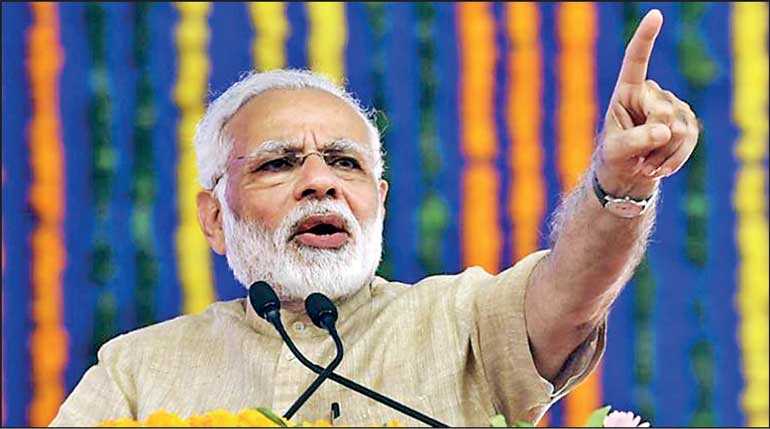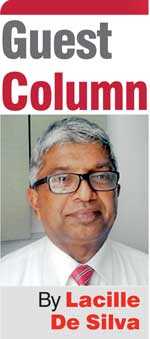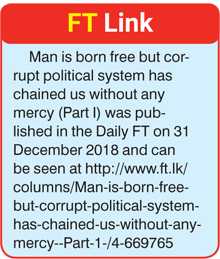Friday Feb 20, 2026
Friday Feb 20, 2026
Monday, 7 January 2019 00:59 - - {{hitsCtrl.values.hits}}

Ours is a country where politicos abuse and manipulate political office, with efficiency and effectiveness, to maximise the outcomes to themselves. The public authorities do not hold investigations or inquiries. Due to interference and manipulations, Arjuna Mahendran and many more are evading arrest. The system has paved the way for impunity, which no doubt is a creation by the Government. Impunity exists in countries where there is a deficit of democratic structures of accountability, fairness and impartiality. 
The then Prime Minister the late J.R. Jayewardene, on 2 February 1978, during the debate on Special Presidential Commissions of Inquiry Bill, which was introduced to deal with Mrs. B had said, I quote: “If a person has made money in any of his positions, whether as Minister, or Deputy Minister, or as an official, he should not be entitled to use his ill-gotten gains. The Government must have the right to say that that money should be confiscated till the decision is given. My argument is no democratic system of government could survive unless you stop abuse, arbitrary behaviour or undue victimisation or give undue protection by abusing powers, with impartiality, accountability and fairness.”
The late Minister Lalith Athulathmudali while taking part in the debate on the imposition of Civic Disability on and Expulsion from Parliament (of the late Sirima R.D. Bandaranaike and the late Felix R. Dias Bandaranaike on 16 October 1980), had said – I quote: “She gave us a resume of what she has done. Of course, she has done a lot, but it is in the very nature of politics that people in high office have to continue to maintain high standards. And if once they fell down, if having done 20 years of good work you do one wrong act, one act of corruption, one act of abuse of power, then that is the penalty that political life extracts from you. If you do not believe do not stay in politics.”
Sri Lanka’s political culture in crisis
In Sri Lanka, since the enactment of the 1st Constitution and particularly after the 2nd, the country’s democratic political culture has been drastically changed and it is in a severe crisis now. The Proportional Representation system too has been disastrous in the country, which reduced the responsiveness to the voter too. JRJ thereafter to get greater control of the elected members obtained undated letters of resignations prior to the referendum (1982) to strengthen his hands to dominate his party members in Parliament. JRJ in a highly undemocratic manner used the provision of holding a referendum, which has an inherent legality to extend the life of Parliament after 1982 for the purpose of retaining a five-sixths majority in Parliament.
JRJ paved the way to establish a weak Parliament, a weak Judiciary and legal system which does not guarantee the equality and the impartiality before the law, a weak Police force, etc. Radhika Coomaraswamy had stated, I quote: “This wholly unwarranted and unprecedented resort to the referendum principle to circumvent the usual electoral process delegitimised the parliament and also deprived the opposition of the share of seats they would have been entitled to in a parliamentary election under the proportional representation system.” It is a denial of voting rights to the citizen – a denial of democracy too.
The recent constitutional crisis eventually ended up after the Supreme Court suspended a presidential order dissolving Parliament and calling fresh elections. All this constitutional and political turmoil is being closely monitored by the international community. Having removed Ranil, we could not however endorse the presidential move to tie up with the former President at any cost. The citizens too do not approve lethargy and inaction with regard to the impending legal action against those who are responsible for all types corruption committed including the bond scam.
Functions of the supreme Legislature
Let me now, (if in case the President is committed to do his task right), briefly state the duties and functions of the supreme Legislature:
In a democracy, the representation of the people is the foremost duty of parliamentarians. During the last few decades, they had miserably failed to live up to the expectations of the citizens and perform their primary roles and duties towards the country and the citizens. Their performance has been unethical, disgraceful, un-parliamentary and disorderly. They have brought immense shame and disrepute to the august assembly. The Parliament of Sri Lanka is currently very weak. Parliamentarians do not have the sense of duty and beyond that the passion to serve the nation. 
Parliamentarians need to be told that democratic governments that fail to deliver basic levels of stability and service risk losing their legitimacy. Good governance is the only way in which governments and public sector institutions could guarantee the rule of law, promote economic growth, and provide some measure of social protection to citizens. Generally, the term ‘democratic governance’ refers to a government’s ability to deliver on these promises while adhering to democratic values of transparency, representation, pluralism and accountability.
Accusations against MR regime
The Yahapalana Government soon after they were elected blamed the previous regime that projects had been started without even conducting a suitable cost-benefit analysis, for the purpose. Furthermore, they accused the MR Government that all such public debt spreads for the future too and the bills are passed on to the future generations for rep-payment. Most of these loans have been taken subject to the condition that debts reach maturity in the following year. Nevertheless, it is true that these debts have however not generated any income for the country at all. They have not carefully assessed whether the loans involve risks, or if not whether the investments would contribute to the boosting of the economy and to improve the living standards of the citizens in the long term.
The MR regime accordingly had failed miserably to undertake an assessment to ascertain the socio-economic benefits whether the projects will help to increase the overall prosperity in the society. Since the investment proposals have not been carefully assessed and judiciously chosen, all these are total waste of funds. Future generations will be forced to carry forward the burden for no fault of theirs. The funds amounting to billions and trillions have ended up in the pockets of rent-seeking politicos. Shouldn’t they have invested the billions and trillions to uplift the poor people’s lives?
Vast resources are needed for our children for their future educational strategy and for improvement of the educational level. Instead, they had chosen to close rural schools: 2006 – 14, 2007 – 37, 2008 – 17 and in 2009 – 103. They have destroyed the formal school system, which principally was created by the late C.W.W. Kannangara, the father of our free education in our country. Our leaders have disrupted the formal school system totally in rural areas and had deprived children of their basic rights and amenities – including the right to education. Most of our children suffer untold hardships without food, clothing, and even proper shelter.
Rent-seeking rulers have deprived our children including the nourishment and care of the mind, which is vital for the growth and development of a human being from his infancy to his adolescence and beyond. We must not forget that children and young people are a high priority area for investment. Transport, housing, etc. in Sri Lanka are other major issues, where solutions need to be found at the earliest. We had the CTB which had been the third largest transportation company in the whole world at the time. All that had been sold and privatised for a pittance having given flimsy excuses. We need high rises now. Housing projects similar to Bambalapitiya and Maligawatte housing schemes are a must. Rent can finance the payment of interest and loan instalments.
Unfulfilled pledges
Up to now, none of the politicians have fulfilled the pledges made by them except ending the war. Afterwards, overseas funds intended for development including public money meant for public good have been robbed from State by all these thieves of State. The time has come for Sri Lankan people to come out against corruption because Sri Lankan politicians will never do the needful to minimise corruption. It could also be seen that not only politicians, we have businessmen, public servants and even religious leaders, who are being accused of corruption.
In our country both major parties have proved again and again that they have failed. Furthermore, during the last few decades we did not have rulers at the top who respect ethics and morality. Corruption has therefore become so ingrained in our society to such an extent that it is so hard to find someone who is not corrupt. We now therefore need to understand the realistic ground situation and educate the masses that honest and patriotic people need to work hard collectively to create the change. Let us now view this situation seriously and say “no” to corruption.
Indian example
In India, Prime Minister Narendra Modi has no reason to worry at all about winning the impending elections, which is due in three more months. Modi during the past five years has done so much in India to take the country forward, with courage and conviction, and with no malice towards any one. He has taken necessary steps to boost the expectations and the confidence of the masses and taken valiant efforts to build pride among the Indians. It is certainly creditable that Modi has succeeded in achieving industrial and economic growth as well, under his able leadership.
At the time Modi was elected to power, India was steeped in corruption. People therefore having lost faith, had simply wondered that no one will succeed in minimising corruption in such a vast country like India. Modi has finally proved conclusively that it is possible to run a corruption-free central government. It must be mentioned that corruption has so far not been eradicated totally in India. Modi has given good hope to people that corruption-free governance is an achievable goal. My experience is that for fighting corruption, long-drawn planning and careful strategies are needed to win the anti-corruption struggle.
(To be continued.)